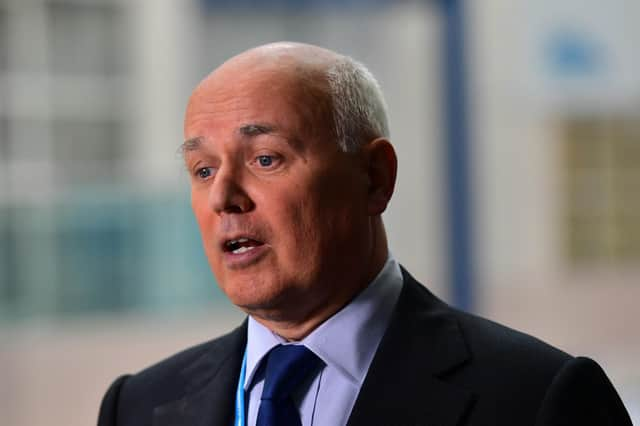China sanctions: banned MPs vow to ‘redouble’ efforts against Uighur human rights abuses


Five MPs and peers sanctioned by China for speaking out against the treatment of the Uighur people have vowed to “redouble” their campaigning efforts.
Former Tory leader Sir Iain Duncan Smith is among the parliamentarians slapped with sanctions, as well as peers Lord Alton and Baroness Kennedy.
Advertisement
Hide AdAdvertisement
Hide AdPrime Minister Boris Johnson said on Friday that he “stands firmly” with those targeted by Beijing for criticising human rights abuses in the country.
The sanctions followed similar ones imposed by the UK on China over the treatment of the Uighur people in Xinjiang.
Along with Sir Iain and the two peers, Tom Tugendhat, Neil O’Brien, Tim Loughton and Nusrat Ghani, and barrister Geoffrey Nice and academic Joanne Nicola Smith Finley were singled out by China’s Ministry of Foreign Affairs.
In a joint statement, five of the sanctioned parliamentarians said they would “continue to advocate” on the behalf of groups oppressed by the Chinese regime.
‘Unmasked the Chinese Communist Party’
Advertisement
Hide AdAdvertisement
Hide Ad“Today’s sanctions have unmasked the Chinese Communist Party,” said Sir Iain, ex-ministers Ms Ghani and Mr Loughton, and Lord Alton and Baroness Kennedy.
“These actions are not only an attack on us as individuals but an attempt to stifle the free and open debate that is at the heart of our parliamentary democracy.
“Intimidation will only serve to encourage us to redouble our efforts.
“We will continue to advocate on behalf of the Uighurs, Tibetans, Hong Kongers and all other persecuted groups in China.
Advertisement
Hide AdAdvertisement
Hide Ad“These are the true victims of the Chinese government’s authoritarian rule, not us.”
Dr Smith Finley said she had been sanctioned “for ongoing research speaking the truth about human rights violations” against Uighurs and other Turkic Muslims in Xinjiang.
“I have no regrets for speaking out, and I will not be silenced. I would like to give my deep thanks to my institution, Newcastle University, for its staunch support for my work and its ongoing commitment to academic freedom, social justice and inter-ethnic equality,” she said.
‘Subverting democracy’
Mr Tugendhat, chairman of the Commons foreign affairs committee, called the action by the Far East powerhouse an attempt to “subvert the democracy and sovereignty of the British people”.
Advertisement
Hide AdAdvertisement
Hide AdBoris Johnson said those sanctioned were “performing a vital role” in highlighting abuses and that he stood “firmly with them”.
“The MPs and other British citizens sanctioned by China today are performing a vital role shining a light on the gross human rights violations being perpetrated against Uighur Muslims,” the Prime Minister tweeted.
“Freedom to speak out in opposition to abuse is fundamental and I stand firmly with them.”
China’s top diplomat in London, charge d’affaires Yang Xiaoguang, was given a dressing down after being summoned to the Foreign Office.
Advertisement
Hide AdAdvertisement
Hide AdMinister for Asia Nigel Adams told him Beijing’s move was “unwarranted and unacceptable” and would “not distract attention away from those very violations taking place in Xinjiang”, the department said.
‘Industrial-scale human rights abuses’
Foreign Secretary Dominic Raab told broadcasters Britain would “not be deterred from speaking up” against what he called “industrial-scale human rights abuses taking place in Xinjiang”, branding Beijing’s move a “sign of weakness”.
In an earlier statement, he called for China to allow UN human rights inspectors into the province to “verify the truth”, a move backed by Sir Iain and his colleagues.
The government says survivor testimonies indicate more than a million people have been detained without trial in Xinjiang, with widespread claims of torture, rape and sterilisations in the internment camps.
Advertisement
Hide AdAdvertisement
Hide AdChina’s Ministry of Foreign Affairs announced on Friday that the nine sanctioned Britons and their family members will be prohibited from entering China and Hong Kong and that Chinese citizens and institutions will be prohibited from doing business with them.
The groups affected are the China Research Group, the Conservative Party Human Rights Commission, Uyghur Tribunal and Essex Court Chambers.
China ‘strongly’ opposed to British sanctions
It comes in response to Mr Raab this week announcing a package of travel bans and asset freezes against four senior officials and the state-run Xinjiang Production and Construction Corps Public Security Bureau (XPCC PSB), in an internationally co-ordinated move with the US, Canada and European Union.
The Chinese Embassy in the UK rejected claims of human rights violations against the Uighurs, arguing they were the “lies of the century” and based on “fabricated” evidence designed to “demonise” China.
Advertisement
Hide AdAdvertisement
Hide AdA spokesman told a press briefing on Friday China was “strongly” opposed to British sanctions, adding: “Human rights in Xinjiang cannot be defined by a few satellite images, fake reports cobbled together by people thousands of miles away.”
Shadow foreign secretary Lisa Nandy called the sanctions a move intended to “silence and intimidate” those who are critical of Beijing.
“The sanctions on Conservative MPs, a Labour peer and others, won’t have a major impact on them in particular in relation to them having huge business dealings or stakes in China,” the Labour MP told BBC Radio 4’s World At One.
“But nevertheless it is a warning shot which is designed to silence and intimidate those who criticise the actions of the Chinese government.”